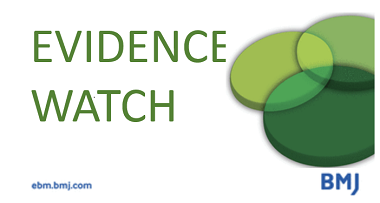This week’s Evidence Watch highlights serious uncertainties with the current evidence-base for influenza vaccination
Carl Heneghan, Editor in Chief
 A systematic review of vaccines in the elderly [1] highlights the difference vaccination makes in a single season (lowers risk of influenza from 6% to 2.4%); but adds caution, in that we have very little information to inform what happens over subsequent seasons.
A systematic review of vaccines in the elderly [1] highlights the difference vaccination makes in a single season (lowers risk of influenza from 6% to 2.4%); but adds caution, in that we have very little information to inform what happens over subsequent seasons.
Also, for what is a global public health priority its mystifying why there are only 8 trials (of which only 4 assess harms) with just over 5000 participants to inform decision making and reduce uncertainty – the first was done in 1965 and the last of these was done in 2000. And there is no data on hospitalisations in any studies, no information on pneumonia and very little information on death. All of the critical outcomes that matter for decision making.
Therefore, I’m in agreement with the author’s conclusion that ‘society should invest in research on a new generation of influenza vaccines for the elderly. Do you think this research will happen anytime soon?
It’s a Cochrane vaccine feast with the publication of vaccines for preventing influenza in healthy adults: [2] 52 trials with over 80,000 people were included in this review. Inactivated influenza vaccines reduced influenza from 2.3% to 0.9%: 71 healthy adults need to be vaccinated to prevent one experiencing influenza, with no effect on hospitalisation or days off work and a slight increase in fever at the time of vaccination
Uncertainties also exist over health care worker vaccines. A systematic review by the same group found four cluster-RCTs and one cohort study of vaccination for healthcare workers caring for ≥ 60 years in nursing homes. [3] Biases in the research included problems with lack of blinding, contamination and low rates of vaccination in the intervention groups
Offering influenza vaccination to HCWs based in long-term care homes may have little or no effect on the number of residents who develop laboratory-proven infection. The review found no conclusive evidence of the benefits of healthcare worker vaccination on the complications that matter: pneumonia, hospitalisation or death.
It seems we need a fundamental re-think of influenza vaccinations research and how we go about it – we need independent, well-designed trials that go over more than one season to reduce uncertainty and ensure we offer interventions based on evidence and not hope.
References
[1] Vaccines for preventing influenza in the elderly. Demicheli V., Jefferson T., Di Pietrantonj C., et al. 2018. Cochrane Database of Systematic Reviews, 2018(2), CD004876
[2] Vaccines for preventing influenza in healthy adults. Demicheli V., Jefferson T., Ferroni E., Rivetti A., & Di Pietrantonj C. 2018. Cochrane Database of Systematic Reviews, 2018(2), CD001269.
[3] Influenza vaccination for healthcare workers who care for people aged 60 or older living in long-term care institutions. Thomas RE, Jefferson T, Lasserson TJ. Cochrane Database Systematic Reviews. 2016(6), CD005187.

BMJ Evidence-Based Medicine – original evidence-based research, insights and opinions on what matters for health care.
Read more about BMJ EBM content in the Welcome to BMJ Evidence-Based Medicine Editorial.
Carl Heneghan is Professor of EBM at the University of Oxford, Director of CEBM and Editor in Chief of BMJ EBM
Follow on twitter @carlheneghan
Competing interests
Carl has received expenses and fees for his media work including BBC Inside Health. He holds grant funding from the NIHR, the NIHR School of Primary Care Research, The Wellcome Trust and the WHO. He has also received income from the publication of a series of toolkit books published by Blackwells. CEBM jointly runs the EvidenceLive Conference with the BMJ and the Overdiagnosis Conference with some international partners which are based on a non-profit model.